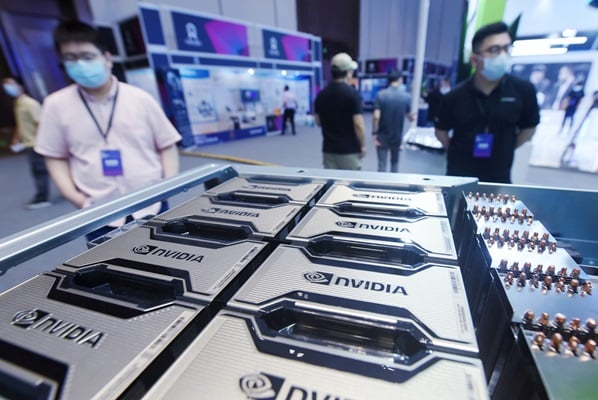Nvidia is developing a version of its new flagship AI chips that complies with current U.S. export controls for the Chinese market.
In March, Nvidia unveiled its “Blackwell” chip series, set for mass production later this year. These new processors combine two silicon squares, each the size of the company’s previous offerings.
The B200 chip in this series is 30 times faster than its predecessor in tasks like chatbot responses.
According to two sources, Nvidia will collaborate with Inspur, one of its key distributor partners in China, to launch and distribute the chip, tentatively named the “B20.”
The sources requested anonymity as Nvidia has not yet made a public announcement. Nvidia’s spokesperson declined to comment, and Inspur did not respond to requests for comment.
US export restrictions
In 2023, Washington tightened export controls on advanced semiconductors to China to prevent advancements in supercomputing that could benefit China’s military. Since then, Nvidia has developed three chips specifically for the Chinese market.
These stricter U.S. export controls have allowed Chinese technology giant Huawei and startups like Tencent-backed Enflame to make inroads into the domestic market for advanced AI processors. A Chinese-market version of Nvidia’s Blackwell chip would bolster the U.S. company’s efforts to counter these challenges.
China accounted for about 17% of Nvidia’s revenue in the fiscal year ending in January, down from 26% two years earlier due to U.S. sanctions. According to a May report by Reuters, Nvidia’s most advanced chip for the Chinese market, the H20, initially had a slow start when deliveries began this year and was priced lower than a rival chip from Huawei. However, sales are now growing rapidly, according to two sources.
According to an estimate from research group SemiAnalysis, Nvidia is on track to sell over 1 million H20 chips in China this year, worth more than $12 billion.
Geopolitical and regulatory outlook
Expectations are high that the U.S. will continue to pressure semiconductor-related export controls. Sources said the U.S. seeks to have the Netherlands and Japan further restrict chipmaking equipment exports to China. The Biden administration also has preliminary plans to place guardrails around the most advanced AI models, the core software of AI systems like ChatGPT, sources added.
Chip stocks worldwide tumbled last week after Bloomberg News reported that the Biden administration was considering the foreign direct product rule, which would allow the U.S. to block a product’s sale if it is made using American technology.






Leave a Comment